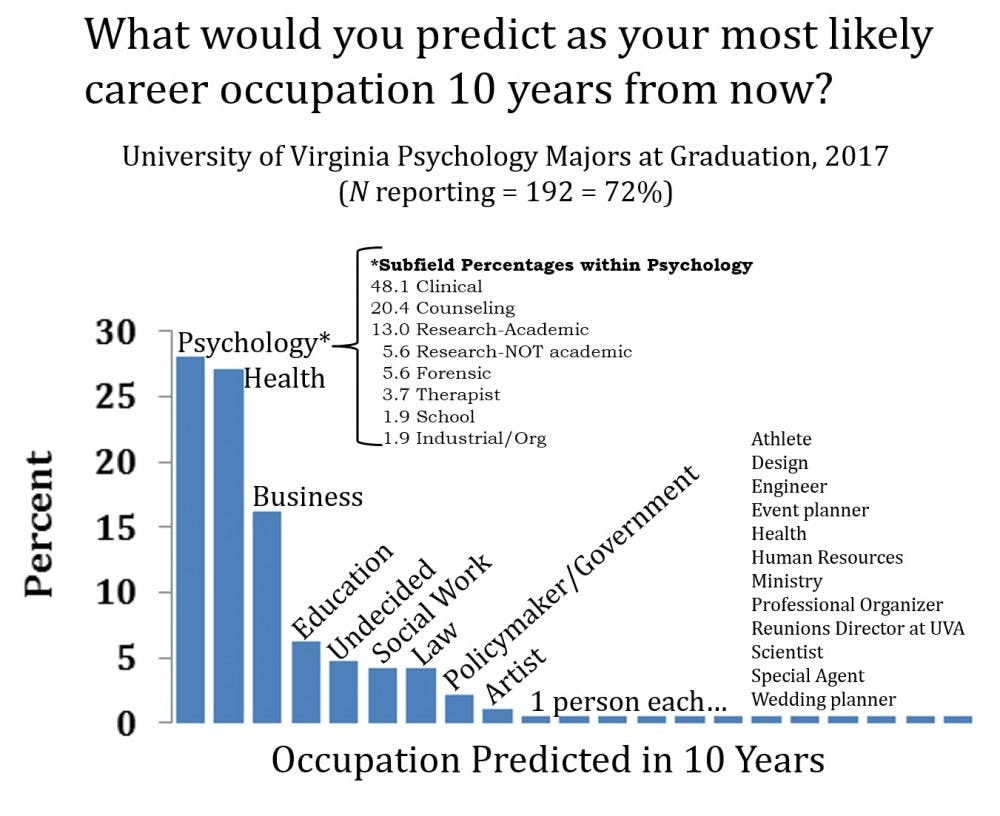STEM grads in fields as diverse as engineering and psychology frequently enter careers or graduate programs in areas outside their undergraduate course of study.
Many STEM students pursue careers in medicine, research or start-ups. However, according to Christie Julien, assistant director of the Engineering, Science and Technology community for the Career Center, employers in non-science fields — such as business and public service — look for the skills a STEM education provides as well.
“The long and short of it is that STEM students bring a lot to the table not only in terms of mastery of content, but also in terms of analytical, logistical and procedural thinking,” Julien said in an email to The Cavalier Daily. “The question is less about what can a student do if they are not pre-med but more about what they want to do and how they want to apply the skills they’ve gained by engaging deeply in a scientific discipline.”
Julia Lapan, director of Engineering Career Development, said engineering students may be more likely to go into a business job than one in engineering. She listed Accenture, IBM, Google, Microsoft and Northrop Grumman as companies that frequently recruit from the engineering school.
“A lot of our engineering students don’t necessarily go to work in engineering,” Lapan said. “So probably one of our biggest industry sectors that our students go into right after graduation is consulting and business services.”
Most psychology students pursue careers in psychology or medicine, but the third most common field of interest reported by 2017 grads was business.
“Analyzing data and understanding behavior is fundamental to business,” said Fred Smyth, lecturer and director of Undergraduate Studies in the Psychology department.
Julien said the role of career services is to help students suit their skills to their career goals, even in different fields.
“The Career Center can lend a hand because we can help an individual student articulate their interests, create [a] plan for how to market their unique experience and coach them on how to effectively network, grow their connections and find the right fit,” Julien said.
Career services can also help students with the mechanics of job searching and accepting offers, especially in the case of on-grounds interviews.
Engineering and business employers looking to hire engineering students start recruiting as early as fall of their third or fourth year. This can cause a lot of stress for students in the process of a career or internship search, Lapan said.
“On-Grounds interviewing gets pretty hot and heavy in the fall, and I think we need to do a better job of supporting students through that,” Lapan said. “We’ve been just trying to help mitigate some of their challenges by helping them take a deep breath — maybe integrating some relaxation techniques into everything that they’re doing [or] working with the employers to try to just give them some guidelines about not putting undue pressure on students.”
Smyth said he often points psychology students to the Career Center’s Education, Counseling and Youth Development community and tries to provide students with an alumni panel at least once a semester.
“I’ll admit that I’m biased, but [psychology is] just a great liberal arts and sciences major,” Smyth said. “I think [psychology is] a pretty awesome platform for going all kinds of directions.”
Many engineering students do stay within engineering disciplines. Civil engineering students, for example, often go into private or public structural or transportation engineering. Lapan also cited software engineering as a common field for computer science majors to enter.
“We have a lot of our computer science students going into software engineering positions, which exist in just about every company,” Lapan said. “Computer skills are really becoming the way of the future that anybody, regardless of their major, really needs to have some background in.”
Graduating fourth-year Engineering student Jenny Xing is one such example. She will be working as a software engineer for SeatGeek, a large start-up in New York City, after graduating from the Engineering school with her degree in computer science.
“What excites me the most about working at SeatGeek is that there’s really good people there,” Xing said. “When I was just looking at jobs, sort of like the witty descriptions … I saw all these people that seemed like really cool people.”
Lapan said she encourages students to think of their working environment and their overall happiness when deciding where to go after graduation.
“I want our graduates to go off and not just check a box, like oh, you got a great job at a great company with a great salary, but are you happy, are you satisfied with your career, are you engaged?” Lapan said. “I want the answer to be a resounding yes.”







